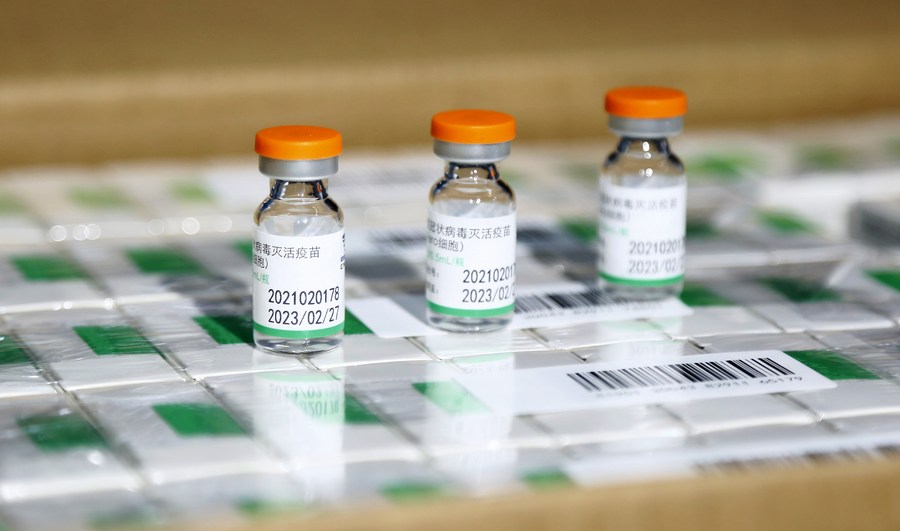
Photo taken on April 3, 2021 shows the newly-arrived COVID-19 vaccines purchased from China at Tbilisi International Airport, Tbilisi, Georgia. (Health Ministry of Georgia/Handout via Xinhua)
BEIJING, April 10 (Xinhua) -- These days, one of the most popular Western narratives against China on the topic of vaccines and diplomacy is, well, vaccine diplomacy. The story goes that the country, which has generously come to the aid of its developing peers with badly-needed, life-saving jabs, is engaged in questionable tricks with ulterior motives.
Wang Yi, Chinese State Councilor and Foreign Minister, said the other day that the country is not trying to engage in "vaccine diplomacy." On the contrary, it is doing "humanitarian work."
"Unlike some major countries that are hoarding the vaccines for their own interests, we want to see more people immunized," he said.
By not naming names or going into further detail, Wang was being diplomatic. But richer countries are failing a rudimentary test of global solidarity by not sharing COVID vaccines.
Countries with the fewest resources are facing the worst health and human-rights outcomes, thanks to the First World's near-monopoly of the global supply of vaccines.
The most notable example is the United States. In early March, the White House Press Secretary claimed, unconvincingly, that "there's no export prohibition, and all vaccine manufacturers in the United States are free to export their products while also fulfilling the terms of their contracts with the U.S. government."
But what is written into the contracts? "The U.S. government has not released its contracts with vaccine manufacturers in full, but clauses in the unredacted portions suggest an emphasis on domestic production and exclusivity," Bloomberg reported in late March. "The contracts obligate manufacturers to fill massive U.S. government orders first, a de facto ban on vaccine exports despite Biden administration officials repeatedly saying there's no formal prohibition."
In essence, the world's richest and most powerful country has placed a de-facto "vaccine embargo" on the rest of the world, especially the numerous developing countries that are in dire need and have significantly worse public-health infrastructure.
In fairness, the application of the principle of "America First" to inoculations is not without compelling justifications. The U.S. government is certainly and understandably obliged to prioritize its own citizens, bearing in mind that so many have tragically lost their lives due to the previous administration's incompetence.
Make no mistake: the success of inoculations within the United States is to be welcomed, as every country and person in the world can only be safe amid the pandemic when others are safe. But the United States must shoulder an outsized burden of international responsibility, at least if it wants to continue touting itself as a "beacon of hope."
Thus far, it has failed in this regard, although President Joe Biden took a step in the right direction with his recent pledge, "If we have a surplus, we're going to share it with the rest of the world."
Meanwhile, China has continued inoculating its own citizens while simultaneously providing vaccine aid to 80 countries and three international organizations, exporting vaccines to more than 40 countries, and cooperating with more than 10 nations on vaccine research, development and production.
The fact of the matter is that China has been a very generous provider compared to the United States, and in this context, the finger-pointing is hardly fair. To accelerate the urgent work of vaccinating the rest of the world, more scrutiny should be directed toward those who have the capabilities but have yet to step up. ■




